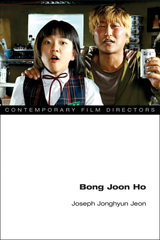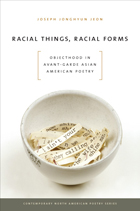2 books by Jeon, Joseph Jonghyun

Bong Joon Ho
Joseph Jonghyun Jeon
University of Illinois Press, 2024
Successful cult films like The Host and Snowpiercer proved to be harbingers for Bong Joon Ho’s enormous breakthrough success with Parasite. Joseph Jonghyun Jeon provides a consideration of the director’s entire career and the themes, ambitions, techniques, and preoccupations that infuse his works. As Jeon shows, Bong’s sense of spatial and temporal dislocations creates a hall of mirrors that challenges us to answer the parallel questions Where are we? and When are we?. Jeon also traces Bong’s oeuvre from its early focus on Korea’s US-fueled modernization to examining the entanglements of globalization in Mother and his subsequent films. A complete filmography and in-depth interview with the director round out the book.
Insightful and engaging, Bong Joon Ho offers an up-to-date analysis of the genre-bending international director.
[more]

Racial Things, Racial Forms
Objecthood in Avant-Garde Asian American Poetry
Joseph Jonghyun Jeon
University of Iowa Press, 2012
In Racial Things, Racial Forms, Joseph Jonghyun Jeon focuses on a coterie of underexamined contemporary Asian American poets—Theresa Hak Kyung Cha, Myung Mi Kim, Mei-mei Berssenbrugge, and John Yau—who reject many of the characteristics of traditional minority writing, in particular the language of identity politics, which tends to challenge political marginalization without contesting more fundamental assumptions about the construction of racial form. In the poets’ various treatments of things (that is, objects of art), one witnesses a confluence of heretofore discrete factors: the avant-garde interest in objecthood and the racial question of objectification.
By refashioning avant-garde investigations of things into questions about how American discourse visualizes race in and on the body, these poets implicitly critique dominant modes of racial visibility, seeking alternatives to the unreflective stances that identity politics often unwittingly reproduces. At the heart of Jeon’s project is the assumption thatracial form is continually recalibrated to elide ideological ambiguities and ambivalences in contemporary culture. Thus, rather than focusing exclusively on the subject—on interiority and individual experience—Racial Things, Racial Forms also uses the calculated strangeness of the avant-garde art object as an occasion to emphasize the physical and visual oddness of racial constructs, as a series of everchanging, contemporary phenomena that are in conversation with, but not entirely determined by, their historical legacy.
In this critical study, Jeon argues that by invoking the foreignness of an avant-garde art object as a way to understand racial otherness, these writers model the possibility of a post-identity, racial politics that challenges how race is fundamentally visualized. In addition to appealing to those interested in Asian American studies and race in American literature, Racial Things, Racial Forms addresses readers interested in contemporary poetry, art, and visual culture, paying particular attention to the intersections between literary and visual art.
[more]
READERS
Browse our collection.
PUBLISHERS
See BiblioVault's publisher services.
STUDENT SERVICES
Files for college accessibility offices.
UChicago Accessibility Resources
home | accessibility | search | about | contact us
BiblioVault ® 2001 - 2024
The University of Chicago Press









